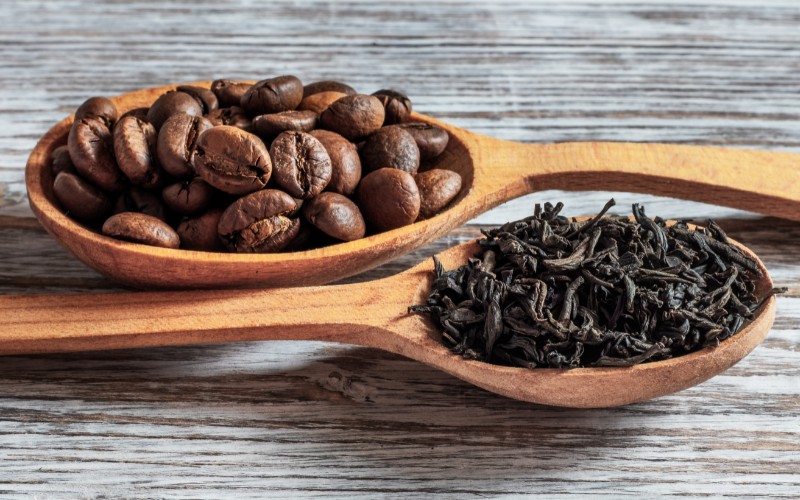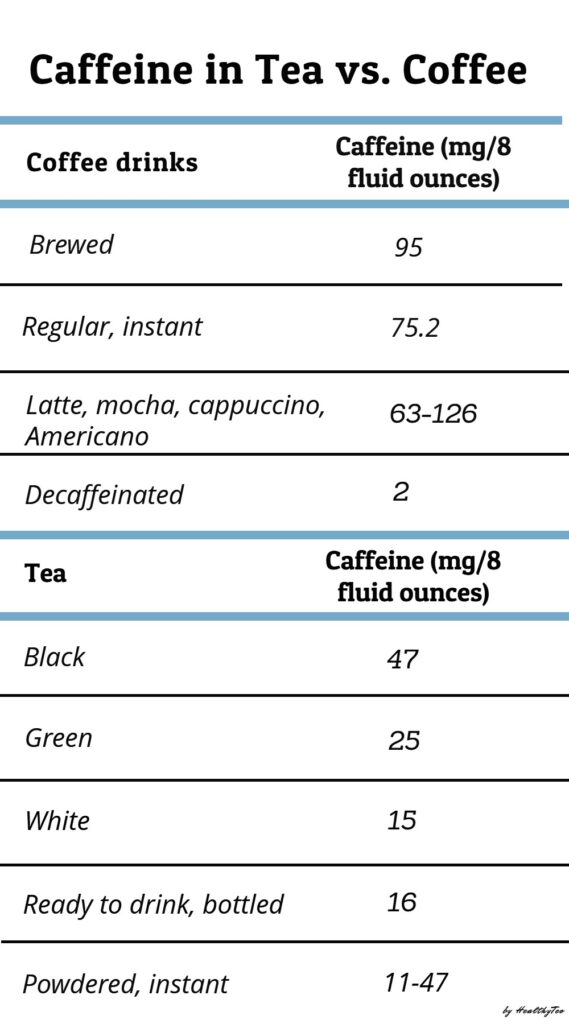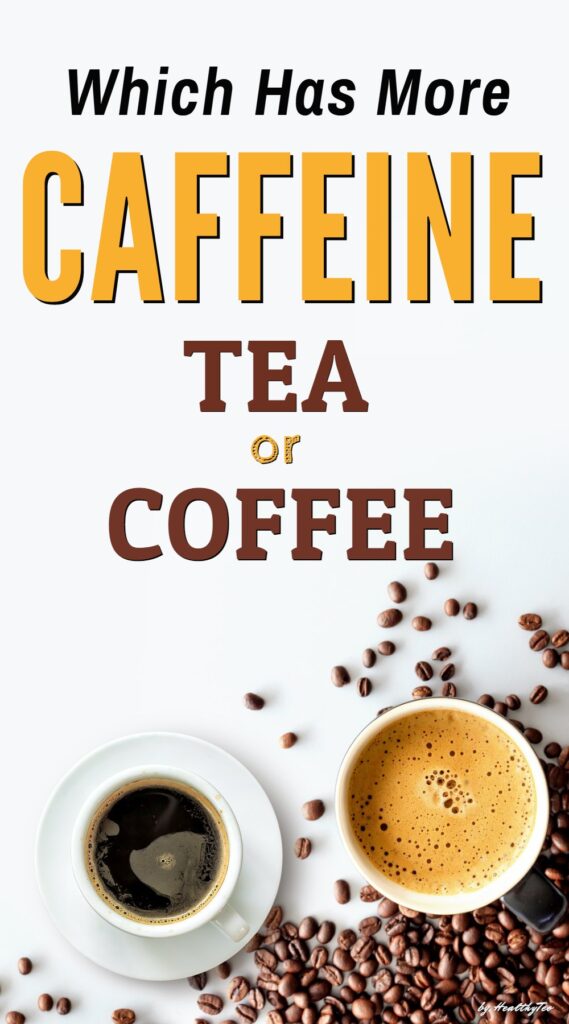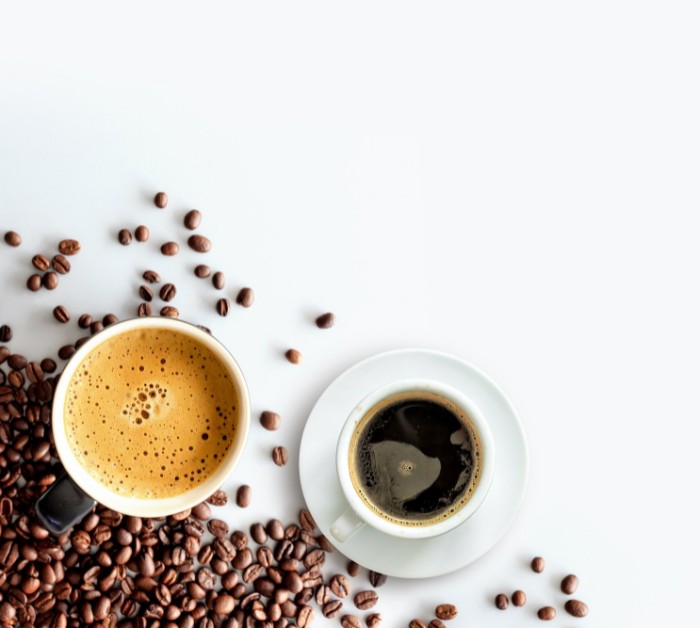Is there more caffeine in tea or coffee?
Brewed coffee has more caffeine than steeped tea. However, before brewing tea leaves contain 3.5% caffeine, while coffee beans have 1.1-2.2% caffeine. The coffee brewing process uses hotter water, which extracts more of the caffeine from the beans. Furthermore, for a cup of coffee, you use more coffee beans than you use tea leaves for a cup of tea drink.
A cup of coffee is more concentrated than a cup of tea since we tend to use about 2 grams of tea leaves per 8 ounces (237 ml) cup compared to at least 10 grams of coffee grinds for a cup of coffee.
Coffee is stronger because it’s extracted more than tea during the brewing process, and coffee is usually brewed at a higher temperature than tea (around 195F to 205F) which results in higher caffeine levels.
This post may contain affiliate links, which means we may receive a small commission, at no cost to you, if you make a purchase through a link. For more information, please see our disclosure.
Caffeine levels vary a lot in tea and coffee
The amount of caffeine in tea or coffee varies and depends on a number of factors such as method and length of brewing or steeping, origin, and type of coffee or tea.
The variance of caffeine in coffee comes mainly from two species of plant. Robusta varieties have about twice as much caffeine as arabica varietals.
Caffeine levels in tea vary depending on the harvesting and processing of the tea. With tea studies also show that the leaf location on the plant affects caffeine content in that tea.
The youngest leaves highest on the plant contain the greatest concentration of antioxidants and caffeine.

Coffee varieties
Each cup of coffee will contain a different amount of caffeine each time, as a result of:
- Roasting
- Type of coffee
- Serving size
- Type of coffee beans
Roasting
Coffee made from light or medium roasted coffee beans has more caffeine than coffee made from dark roasted beans. The dark roast will have a much stronger flavor, but it will be weaker in caffeine compared to light roasted.
Since dark roast coffees are less dense than light roast ones, you may use a greater amount of grounds or beans when brewing this type, yielding more caffeine per cup.
Type of coffee beans
There are many different varieties of coffee beans that may naturally contain different amounts of caffeine. The most common in the world today is Arabica coffee.
Almost 70% of the world’s coffee comes from Arabica beans. They don’t have as much caffeine as other types of beans.
If you want more caffeine look for Robusta beans that have almost twice the amount of caffeine compared to Arabica beans.
Type of coffee
The caffeine content is different in regularly brewed coffee, instant coffee, espresso, and decaf coffee.
Serving size
One cup of coffee can range from 1-24 oz ( 30-700 ml), greatly affecting the total caffeine content.
Tea varieties
Black, white, oolong, and green tea are made from the leaves of the same plant Camellia sinensis. The time of harvest and level of oxidation is what sets them apart. Black tea leaves are oxidized, oolong leaves are partly oxidized while white and green tea leaves are not.
White tea
White tea leaves and buds are picked just before they are fully open when they are covered in fine white hairs. This is where white tea gets its name. White tea is the least processed all teas.
White tea contains 6-50 mg of caffeine per cup (237 ml). However, the caffeine content in white tea depends on the type of tea buds, and leaves, brand, size, brewing temperature, and steeping time. White tea is a great alternative if you are trying to lower your caffeine intake.
Green tea
Green tea is made from unoxidized leaves and it contains the most antioxidants and beneficial polyphenols. A cup of green tea 8-oz (237 ml) usually contains approximately 35 mg of caffeine.
The actual caffeine content of green tea can vary from type to type and can be anywhere between 12-75 mg of caffeine.
Learn more: What Is Green Tea Good For – Less Caffeine, More Energy
Black tea
This is one of the most consumed beverages in the world. It is often blended with other plants for different flavors such as English breakfast or Earl Grey tea.
Black tea is stronger in flavor and contains more caffeine than other teas, but less than coffee. An average cup of black tea (237 ml) packs 47 mg of caffeine but can contain as much as 90 mg.
Learn more: Is Black Tea Good For You?
Oolong tea
Oolong tea is also made from the Camellia sinensis plant. It is partially oxidized and it is somewhere between black and green tea.
Oolong tea contains a similar amount of caffeine as green tea, somewhere between 10 and 60 mg per 8 ounces cup (237ml), usually 37 mg of caffeine per cup.
If you want more caffeinated teas then matcha green tea and yerba mate tea are good choices for you. Matcha green tea usually comes in powdered form and packs 35 mg of caffeine per 1 gram, half tablespoon serving.
Yerba Mate tea is a traditional beverage in South America and usually contains 85 mg of caffeine per cup (237 ml).
Tea vs. coffee caffeine content

In the table above we’ve presented the caffeine content of different types of tea and coffee in 8 ounces (237 ml) fluid, or in one cup. We didn’t mention just espresso. Espresso is a more concentrated source of caffeine. A single shot of espresso 30 ml has about 58 mg of caffeine.
Among decaffeinated beverages, decaf espresso has the most caffeine with 3-16 mg per 16 ounces (473 ml) serving, whereas decaf coffee typically provides less than 3 mg per 8 ounces cup.
Is tea or coffee better for you?
Both drinks, tea, and coffee are good for you. Which one you will choose mostly depends on how your body reacts to caffeine. Caffeine acts quickly usually 20 minutes to 1 hour of consumption.
If you are sensitive to caffeine tea might be a better choice for you. Tea contains L-theanine an amino acid with calming properties that may relax you while keeping you alert. Consider sticking to teas lower in caffeine like white or herbal teas such as Rooibos tea, Chamomile tea, Peppermint tea, etc.
Another option is to brew high-caffeinated teas for a shorter time such as 1 minute instead of 3 minutes. If you want to replace morning coffee with tea here you can find all possible caffeinated and caffeine-free teas as an alternative to your morning coffee.
On the other hand, if you want high-caffeine drinks you can drink espresso, brewed coffee, or teas with higher caffeine content like black or green tea varieties.
When you drink caffeinated drinks be sure to stay within safe amounts. It’s recommended that if you are a healthy adult you shouldn’t exceed 400 mg of caffeine per day or 200 mg of caffeine at a time. This is equal to no more than three to five 8 ounce cups of regular coffee daily.
Excessive amounts of caffeine are associated with disturbed sleep, restlessness, anxiety, upset stomach, etc. So, it is good to adjust your caffeine intake according to your caffeine sensitivity and how your body responds to it.
From all these mentioned above, we can come to the conclusion that if you are sensitive to caffeine change your coffee with tea.
You can choose between teas with higher caffeine content like black or green tea, tea with a moderate amount of caffeine like white tea, or if you want caffeine-free tea go for herbal teas.

Final thoughts about tea vs. coffee caffeine content
Tea leaves contain more caffeine than coffee beans, but brewed coffee has more caffeine than steeped tea. The caffeine content in your tea or coffee depends on how you prepare, the variety of coffee or tea, brewed temperature, and other factors.
Espresso, brewed coffee, black tea, yerba mate tea, and matcha green tea are highly caffeinated drinks, pure green tea contains a moderate amount of caffeine, white tea is less caffeinated, and herbal teas are caffeine-free.
It is up to you what will you choose. If you want less caffeine try steeping your tea for less time, choose decaffeinated coffee, or simply drink less of the caffeinated drinks. If you can’t tolerate caffeine go for caffeine-free teas like herbal teas.




